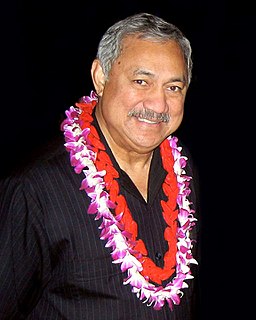Non-voting members of the United States House of Representatives are representatives of their territory in the House of Representatives, who do not have a right to vote on proposed legislation in the full House but nevertheless have floor privileges and are able to participate in certain other House functions. Non-voting members may vote in a House committee of which they are a member and introduce legislation. There are currently six non-voting members: a delegate representing the federal district of Washington D.C., a resident commissioner representing Puerto Rico, and one delegate for each of the other four permanently inhabited US Territories: American Samoa, Guam, the Northern Mariana Islands, and the US Virgin Islands. As with voting members, non-voting delegates are elected every two years, and the Resident Commissioner of Puerto Rico is elected every four years.

The American Samoan Legislature or Fono has two chambers, the House of Representatives and the Senate with a directly elected head of government, the Governor of American Samoa. The House of Representatives has 21 members, elected for a two-year term, 14 in single-seat districts, 6 from dual-seat districts and 1 by a public meeting on Swain Island. The Senate has 18 members, elected for a four-year term by and from the chiefs of the islands. The Governor and their deputy, the Lieutenant Governor are elected on a 4-year term.

General elections was held in American Samoa on 4 November 2008, coinciding with the 2008 United States general elections.
Republican Party of American Samoa is the affiliate of the U.S. Republican Party in American Samoa. The party was founded by Peter Tali Coleman.
A.U. Fuimaono was an American Samoan politician and Paramount Chief who served as American Samoa's first Delegate-at-Large to the United States House of Representatives from 1970 until 1974. Fuimaono also served as the Governor of Western District, American Samoa on the island of Tutuila from his appointment in 1993 until his death in 2008.

The United States House of Representatives election in American Samoa took place on November 4, 2008 to elect the delegate from American Samoa's At-large congressional district. The non-voting delegate to the United States House of Representatives is elected for two-year terms; whoever is elected will serve in the 111th Congress from January 3, 2009 until January 3, 2011. The election coincides with the 2008 U.S. presidential election. Incumbent Eni Faleomavaega was re-elected.
Tuika Tuika Jr. is an American Samoan accountant and politician. He has worked for various American Samoan government offices for many years.

The United States House of Representatives election in American Samoa, which will contest American Samoa lone At-large congressional district, was held on November 2, 2010. The non-voting delegate to the United States House of Representatives is elected for two-year terms; whoever is elected will serve in the 112th Congress from January 3, 2011 until January 3, 2013.

The American Samoan general election of 2010 took place on November 2, 2010. The deadline to register as a candidate for the election was September 1, 2010.

General elections were held in American Samoa on 6 November 2012, alongside a referendum on giving the Fono veto power over the Governor. Voters chose a new governor and lieutenant governor, twenty members for the American Samoa House of Representatives, and the Delegate to United States House of Representatives. Incumbent governor Togiola Tulafono was term-limited and could not seek re-election.

The United States House of Representatives election in American Samoa, which contests American Samoa lone At-large congressional district, was held on November 6, 2012. The non-voting delegate to the United States House of Representatives is elected for two-year terms; the winner, incumbent Rep. Eni Faleomavaega of the Democratic Party, will serve in the 113th Congress from January 3, 2013 until January 3, 2015. Faleomavaega has held the seat since 1989.

The Stop Tobacco Smuggling in the Territories Act of 2013 was a bill introduced into the United States House of Representatives in the 113th United States Congress that passed the House with a vote of 421-5. The purpose of the bill is to redefine "state" in the Contraband Cigarette Trafficking Act of 1978 to add American Samoa, the Commonwealth of the Northern Mariana Islands, and Guam, so that United States laws against tobacco smuggling would apply in those places. The 1978 Act makes it a felony to smuggle cigarettes from one area to another without paying the appropriate taxes. Smugglers trafficking in cigarettes transport cigarettes to jurisdictions with high cigarette taxes, avoid paying the taxes, and then sell the smuggled cigarettes with a large profit margin, while still selling their cigarettes for a cheaper price than those that could be purchased legally.

The 2016 American Samoa gubernatorial election was held on November 8, 2016, coinciding with the 2016 United States presidential elections and other US elections.

The 2020 United States elections will be held on Tuesday, November 3, 2020. All 435 seats in the United States House of Representatives, 34 of the 100 seats in the United States Senate, and the office of President of the United States will be contested. Thirteen state and territorial governorships, as well as numerous other state and local elections, will also be contested.

The 2018 United States House of Representatives election in American Samoa was held on Tuesday, November 6, 2018, to elect the non-voting Delegate to the United States House of Representatives from American Samoa's at-large congressional district. The election coincided with the midterm elections for other federal and territorial offices, including the larger American Samoa general election, as well as the nationwide 2018 United States House of Representatives elections and the 2018 United States general elections.
Events in the year 2017 in American Samoa.











